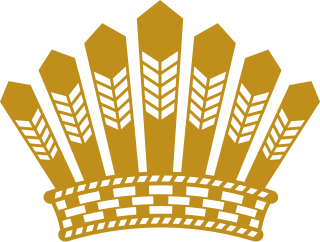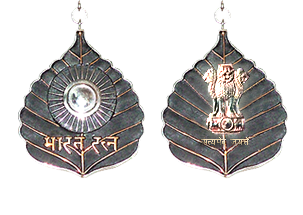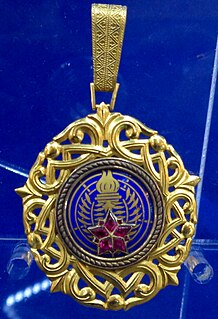In the United Kingdom and the British Overseas Territories, personal bravery, achievement, or service are rewarded with honours. The honours system consists of three types of award:

The Order of Canada is a Canadian national order and the second highest honour for merit in the system of orders, decorations, and medals of Canada, after the Order of Merit.

The Most Excellent Order of the British Empire is a British order of chivalry, rewarding contributions to the arts and sciences, work with charitable and welfare organisations, and public service outside the civil service. It was established on 4 June 1917 by King George V and comprises five classes across both civil and military divisions, with the most senior two classes making the recipient either a knight if male or dame if female. There is also the related British Empire Medal, whose recipients are affiliated with, but not members of the order.

The Royal Victorian Order is a dynastic order of knighthood established in 1896 by Queen Victoria. It recognises distinguished personal service to the monarch of the Commonwealth realms, members of the monarch's family, or to any viceroy or senior representative of the monarch. The present monarch, Queen Elizabeth II, is the sovereign of the order, the order's motto is Victoria, and its official day is 20 June. The order's chapel is the Savoy Chapel in London.

The president of the Co-operative Republic of Guyana is the head of state and the head of government of Guyana, as well as the commander-in-chief of the armed forces of the Republic, according to the Constitution of Guyana. The president is also the chancellor of the Orders of Guyana. Concurrent with their constitutional role as Commander-in-Chief of the Armed Forces, the President does not appoint a separate Minister of Defence. That portfolio is held by the President who fulfils all responsibilities designated to a minister of defence under the Defence Act.

An order is a visible honour awarded by a sovereign state, monarch, dynastic royal house or organisation to a person, typically in recognition of individual merit, that often comes with distinctive insignia such as collars, medals, badges, and sashes worn by recipients.
The Order of the Companions of O. R. Tambo is a South African honour. It was instituted on 6 December 2002, and is granted by the President of South Africa to foreign citizens who have promoted South African interests and aspirations through co-operation, solidarity, and support.
The orders, decorations, and medals of Canada comprise a complex system by which Canadians are honoured by the country's sovereign for actions or deeds that benefit their community or the country at large. Modelled on its British predecessor, the structure originated in the 1930s, but began to come to full fruition at the time of Canada's centennial in 1967, with the establishment of the Order of Canada, and has since grown in both size and scope to include dynastic and national orders, state, civil, and military decorations; and various campaign medals. The monarch in right of each Canadian province also issues distinct orders and medals to honour residents for work performed in just their province. The provincial honours, as with some of their national counterparts, grant the use of post-nominal letters and or supporters and other devices to be used on personal coats of arms.
Orders, decorations, and medals of Georgia are the orders, state decorations and medals that are granted by the national government of Georgia for meritorious achievements in national defense, state improvement, and the development of democracy and human rights.

The National Assembly is one of the two components of the Parliament of Guyana. Under Article 51 of the Constitution of Guyana, the Parliament of Guyana consists of the President and the National Assembly. The National Assembly has 65 members elected using the system of proportional representation. Twenty five are elected from the ten geographical constituencies and forty are awarded at the national level on the basis of block votes secured, using the LR-Hare Formula as prescribed by the elections Laws (Amendment) Act 15 of 2000.
The Order of Karađorđe's Star is Serbia's highest civilian and military decoration. It originated in the Kingdom of Serbia, and was initially awarded exclusively to Serbian citizens in return for services rendered to the Serbian monarchy, the Serb people and the Serbian state, though it is now bestowed upon Serbs and non-Serbs alike. During the Balkan Wars and World War I, the Order was mostly awarded for acts of bravery on the battlefield. The post-war Kingdom of Yugoslavia retained the Order, and it was awarded by the Yugoslav government-in-exile until the end of World War II, in some cases to individuals who collaborated with the Axis powers. Following the war, the monarchy was outlawed and a communist government came to power. Along with other monarchist symbols, the Order was suppressed during the administration of Josip Broz Tito, and replaced with communist decorations such as the Order of the People's Hero. During the Cold War, it had been awarded by the Karađorđević family in exile.

The Indian honours system is the system of awards given to individuals for a variety of services to the Republic of India. The categories of awards are as follows:
Orders, decorations and medals of Bulgaria are regulated by the law on the Orders and Medals of the Republic of Bulgaria of 29 May 2003.

The Order of Merit is a Portuguese Honorific Order of civil merit intended to award those responsible for meritorious acts or services performed in the exercise of any functions, both in the public and the private sphere, which reveal self-sacrifice in favor of the community. The decorations are given by the President of the Portuguese Republic, in his role as the Grand-Master of the Portuguese Honorific Orders. The Order of Merit can be awarded, during life or posthumously, to both Portuguese and foreign citizens; it can also be awarded to localities or institutions that are legal persons governed by public law or of public utility. This order has been awarded to a number of people performing the most diverse functions such as ambassadors, businesspeople, military personnel, athletes and musicians.

The Order of the Yugoslav Star was the highest national order of merit awarded in Yugoslavia. It was divided into four classes. The highest class, the Yugoslav Great Star was the highest state decoration awarded in Yugoslavia. The order was mostly awarded to foreign heads of state for the development and strengthening of peace and cooperation between nations.
Ireland has no formal honours system. Proposals to introduce one have been made by various groups at different times. The Order of St. Patrick, established by the British monarchy in the Kingdom of Ireland in 1783, has been in abeyance for decades. The Constitution mandates that "Titles of nobility shall not be conferred by the State."

The Order of Roraima of Guyana is the second highest National Award of Guyana, and is limited to only thirty five living Guyanese recipients. Established in 1976, it is awarded to any citizen of Guyana who has given outstanding service to the nation. Citizens of foreign nations who are deemed eligible may be appointed as honorary members of the order.
The Orders, decorations, and medals of Guyana were established after Guyana gained independence from the United Kingdom. In 1970 Guyana became a Republic and established its first two national awards under the Constitution of the Orders of Guyana. In 1976, the Constitution of the Orders of Guyana was amended to add a third national award.
The existing Bangladeshi honours system was created after Independence of Bangladesh. The most recognized civil awards are Ekushey Padak and Independence Day Award. They are awarded every year. The awards are civilian awards for a broad set of achievements in fields such as Education, Arts, Civil Service, or Social Service and Liberation War. Awards were also bestowed posthumously and they are not given for foreign citizens.
The Pakistan Civil Awards were established on March 19, 1957, following the proclamation of Pakistan as an independent republic on March 23, 1956. The announcement of civil awards is generally made once a year on Independence Day, August 14, and their investiture takes place on the following Pakistan Day, March 23. According to Article 259 of the Constitution of Pakistan 1973, along with the Decorations Act, 1975, the President of Pakistan confers civil awards on Pakistani citizens in recognition of gallantry. Awards for Pride of Performance are conferred for outstanding achievements in the fields of art, literature, science, sports and nursing.










